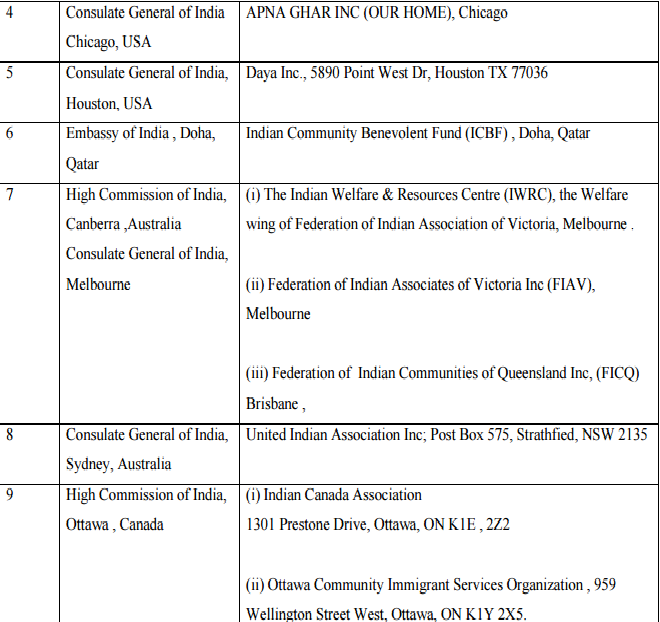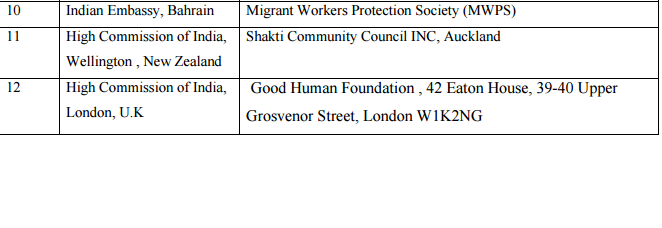NRI matrimonial disputes
Mostly there arise two types of disputes relating to an NRI marriage.
- First, where the NRI bridegroom marries an Indian girl, takes a certain amount of money as dowry and ultimately fly away abroad leaving behind his wife in India.
- Second, cases where both the husband and the wife being Indian married abroad. After their marriage, they develop issues such as extra-marital love affair of any of the spouses within the marriage, ill-treatment, harassment within the marriage. Thereof, either the husband or the wife travels back to India and files a suit in an Indian court.
Parallel matrimonial petitions, one in the foreign country where the couple is residing, and another in India by the parties is very common.
Who is an NRI and what is an NRI marriage
A person holding an Indian passport and temporarily emigrated to another country for a certain period is called an NRI. ‘NRI marriages’ generally means a marriage between an Indian woman and an Indian man who is residing in another country,(NRI- non-resident Indian), either an Indian citizen (when he would legally be an ‘NRI’) or as citizen of that country (when he would legally be a PIO- person of Indian origin).
For more on Frauds and problems relating to NRI marriage, please visit https://blog.ipleaders.in/issues-in-nri-marriages/
Which law applies in Non-resident Indian marriage
Various laws governing NRI marriages are Hindu Marriage Act, 1955, Special Marriage Act, 1954, The Foreign Marriage Act 1969 and other personal law through which both the spouses are governed. The law under which the parties have married is the law which will govern the marriage disputes. Other rights relating to matrimonial alliances such as inheritance and succession, adoption are also regulated by the same family of law.
Interestingly, depending on the laws of the country where the couple resides, even the laws of that country may apply to marriage, divorce and all other sorts of disputes.
What to do if NRI husband or wife is harassed by spouse or in-laws
Provisions of Sections 3 and 4 of the Indian Penal Code comes for rescue in cases where an NRI husband or wife is harassed by spouse or in-laws in a foreign land. Section 3 gives criminal jurisdiction to the courts to try for an offense committed by a person beyond the territory of India provided such person is subject to Indian laws. This sections also applies to those who are covered by any special law bringing them under Indian jurisdiction such as Hindu Marriage Act 1954 or Special Marriage Act.
Section 3 of the Indian Penal Code says, “Any person liable, by any Indian law, to be tried for an offense committed beyond India shall be dealt with according to the provisions of this Code for any act committed beyond India in the same manner as if such act had been committed within India.”
What to do.
There are cases where in-laws while sitting in India exerts pressure for dowry on their daughter-in-law living abroad. In such cases, Section 108 of the Indian Penal code says, “A person abets an offense who, in India, abets the commission of any act within and beyond India which would constitute an offense as if committed in India.”
Here is a stepwise solution on, what to do if NRI husband or wife is harassed by spouse or in-laws.
Step 1 First and foremost, you must not come under pressure to accept the demand for dowry or any other unreasonable demand made by or on behalf of your NRI/ PIO husband to end your ill-treatment, abuse or desertion.
Step 2 You can approach the nearest Indian Embassy/Consulate for assistance/advice, to file a complaint with the local police about harassment, abandonment, ill-treatment, etc.
Step 3 The Indian Embassy/Consulate can assist in providing contact details of local NGOs, approach the local police, contact your family/friends, etc. who could help you.
Step 4 The Indian Mission can be contacted for initial legal/financial assistance to file a case against your husband in the foreign country.
File the police complaint locally and try to solve the problem with the help of local authority first.
Step 5 As the NRI holds the Indian citizenship they can file for cases under the Indian Penal Code for 498A, or other such penal provisions in the Indian Court.
Step 6 Indian courts are competent to entertain such pleas. Therefore, do not be afraid of legal issues while filing the case.
Can NRI file for a divorce in the USA
Couples married in India and living in the USA can seek divorce in the USA. The decree of divorce awarded by the US courts is valid in India. However, the Indian law does not permit ex-parte decree. For the US divorce decree to be valid in India, both of partners should have either contested the divorce or should have mutually consented to divorce in the US Court.
Steps taken by the Indian police to tackle cases of harassment faced by NRI living abroad
Indian state police such as Punjab police have opened an online portal to give solutions to these problems.
Here is the link to the website http://nripunjabpolice.com/index.php
Filing a case in India from abroad through a lawyer. Special Power of Attorney
Special power of attorney (SPA) can be used by a person living abroad to file a divorce case in India. SPA gives the power to an advocate to act legally on your behalf. The process for creating Special Power of Attorney is as follows-
Step 1 Drafting the deed on plain paper.
Step 2 Getting the deed attested from the Indian Embassy or the Consulate.
Step 3 Signing of all the pages by the person making the Special Power of Attorney.
Step 4 Posting your notarized Special Power of Attorney to a trusted person in India through a registered post.
Step 5 The trusted person can get the Draft registered as a Power of Attorney by the appropriate government.
Special Power of Attorney can be used only to file the case. Both the party should be physically present in the court during the respective hearing. As explained in the later part of the article, Indian Court can order to confiscate the passport in case of non-adherence to the summons.
Do’s and don’t’s: NRI marriages
Do’s
- Do check the NRI groom’s personal information particulars such as:
- Marital status: if he is single, divorced, separated, Employment details: qualification and post, salary, address of office, employer and their credentials, Immigration status, type of visa, eligibility to take spouse to the other country
- Financial status, Properties said to be owned by him in India, residence address, family background, Visa, passport. Voter or alien registration card, Social Security number.
- Insist on a registered marriage along with the religious marriage to be solemnized in India with adequate proof like photographs etc.
Don’t’s
- Do not take any decision in haste and do not get pressurized to do so for any reason whatsoever.
- Do not make matrimony a passage to greener pastures abroad by falling prey to lucrative schemes to migrate to another country or promises of getting a green card through marriage.
- Do not finalize marriage matters, without meeting the family or over a long distance, on the phone or through e-mails.
- Do not get pressurized in taking impulsive decisions of a marriage proposal with an NRI just because it appears too perfect to be true.
- Do not negotiate your daughter’s marriage via a bureau, agent or middleman or trust them blindly
- In case matrimonial negotiations take place via matrimonial sites, verify the details and authenticity of particulars submitted about the groom.
- Do not finalize matters in secrecy – publishing the proposal among the near and dear ones, friends and close relatives could help you in getting vital information which you may not be able to collect otherwise.
Do get your marriage registered in India
It is advised to get your marriage registered with a Registrar of the Indian Court. Marriage certificate helps to settle out disputes in numerous ways. Before leaving the country with your NRI/PIO husband or wife, do get the marriage registered in the office of the Registrar in an Indian court.
Is there any governmental scheme to help women who have been abandoned by their husband
Yes. The Ministry of External Affairs, Indian have come out with a plausible solution to this problem. There is a scheme on “Legal and Financial Assistance to Indian Women Deserted by their Overseas Indian Spouses.” The scheme is a welfare measure to support women of Indian origin who have been deserted by their overseas Indian spouses fraudulently, through the Indian Mission abroad with their empanelled NGOs, lawyers, etc.
The list of organization empanelled with the Indian mission abroad to provide legal/financial help to Indian women deserted by their overseas spouse
(Courtsey: http://ncw.nic.in/pdfReports/Background_Note_Seminar_Issues_Relating_to_NRI_Marriages.pdf)
Is there any provision of cancellation of passport
Rajiv Dayal v. Union of India & Ors. is another judgment which shows that the wife also has an available remedy under Section 10 of the Passport Act of impounding and/or revocation of the passport of her NRI husband if he failed to respond to the summons by the Indian courts.
NRI and their appearance before the Indian Court
Section 105 of Criminal Procedure Code (Cr.P.C.) provides for reciprocal armaments to be made by Central Government with the foreign governments about the service of summons/warrants/ judicial processes.
Process of service of summons outside India
- India has ratified The Hague Convention and summons are issued accordingly to the rules of this convention.
- It is the responsibility of the judiciary to forward the Summon to the concerned authority of the state outside India.
- The Central Authority on receiving the summon from the proper judicial authority in India shall make required arrangements to forward the summon to the concerned person.
- Upon the completion of the entire process, a letter will be forwarded to the applicant stating, method, place, date, service and the person’s name to whom summon has been delivered.
- If the entire process is not complete, the Central Authority, along with reasons forwards a letter of the same.
The following case throw some light on the issue where an NRI husband or wife is harassed by spouse or in-laws
- Venkat Perumal v State of Andhra Pradesh is a judgment passed by the Andhra Pradesh High Court on an application filed by an NRI husband for quashing of the proceedings of the wife’s complaint in Hyderabad under Section 498 of the IPC against matrimonial cruelty meted out to her.
- She had alleged that she was subjected to harassment, humiliation, and torture during her short stay at Madras as well as the US and when she refused to accept the request of her husband to terminate her pregnancy, she was dropped penniless by her husband at Dallas airport in the US and she returned back to India with the assistance of her aunt and on account of the humiliation and mental agony she suffered miscarriage at Hyderabad.
- The High Court held that the offense under Section 498-A of IPC is a continuing offense and the mental harassment on the wife had continued during the stay with her parents at Hyderabad. The court therefore rejected contention of the husband that sanction of the Central Government, as contemplated under Section 188 of the Code, is required to prosecute and held that even otherwise, it is not a condition precedent to initiating criminal proceedings and the same can be obtained, if need be, during trial and hence, it could not be said that the proceedings were liable to be quashed on that ground.
The Court also refused to influence its decision with the divorce decree from the US court produced by the husband since in any case the FIR had been lodged by the wife before the UC court’s decree.
Satisfied with the above information? Feel free to comment below if you wish to add into the knowledge. Do comment and share.
LawSikho has created a telegram group for exchanging legal knowledge, referrals and various opportunities. You can click on this link and join:
https://t.me/joinchat/J_
 Serato DJ Crack 2025Serato DJ PRO Crack
Serato DJ Crack 2025Serato DJ PRO Crack














 Allow notifications
Allow notifications



Hi ,
I am writing on the behalf of my sister who has been torched , harassed and ill treated by her husband and in-laws on certain occasion but most recently her NRI husband came from Canada to attend his cousin wedding and before departing to Canada he has beaten up my sister very heartlessly with the help his relatives and his mother and held her captive for 8 hrs in Delhi at his maternal uncle house without food and basic necessities and phone was also taken from her, however she had her old phone and with help of that phone she message her me and my husband on messenger to save her life. My father did not filed a FIR or medical.
Now our case is processing at the DSP office with DSP Deepika singh in Nawanashar but she also not listen to us and listening to one sided conversation and procrastinating the dates to take the declaration of her in-laws and her NRI husband has not contacted since she has beaten her up but after lodging the complaint after 1 month of the incident now he is contacting me saying he wont give him divorce. Can some one advise where to get help from as my sister got proofs but not a medical or FIR.
Sir, if wife is in india and harassing Nri husband even he didn’t took dowry or he didn’t do any misconduct with proofs. What law india can help Nri husband from such humilating cases. Its a women world now in Nri marriage because all the wrong doing done to women live in india by her nri husband. But in my case nri husband is innocent and asking for help. Due to corruption in india Nri husnand is doomed. Please help me out what should i do??
Sir, Your article, inter alia, reads as under
Process of service of summons outside India
India has ratified The Hague Convention and summons are issued accordingly to the rules of this convention.
To my knowledge, India is not a signatory to Hague convention. till 2015. So the above information is not factually correct. If my understanding is not right, you may correct by placing the right documents in support of your statement.
Regards,
[…] Now, just think how good you might feel when an article that you’ve written months ago on NRI marriages helped someone registering a complaint and escaping the foreign land where she was tor… […]